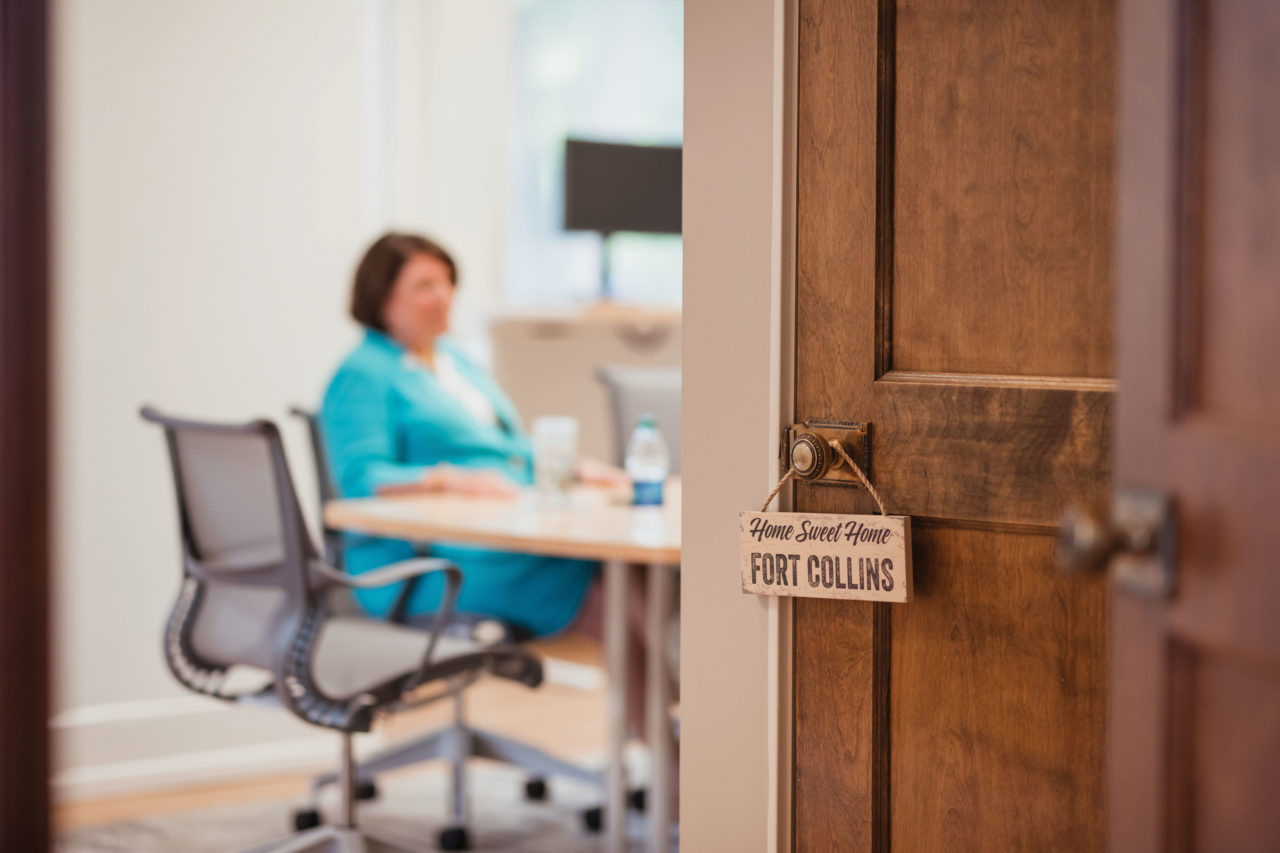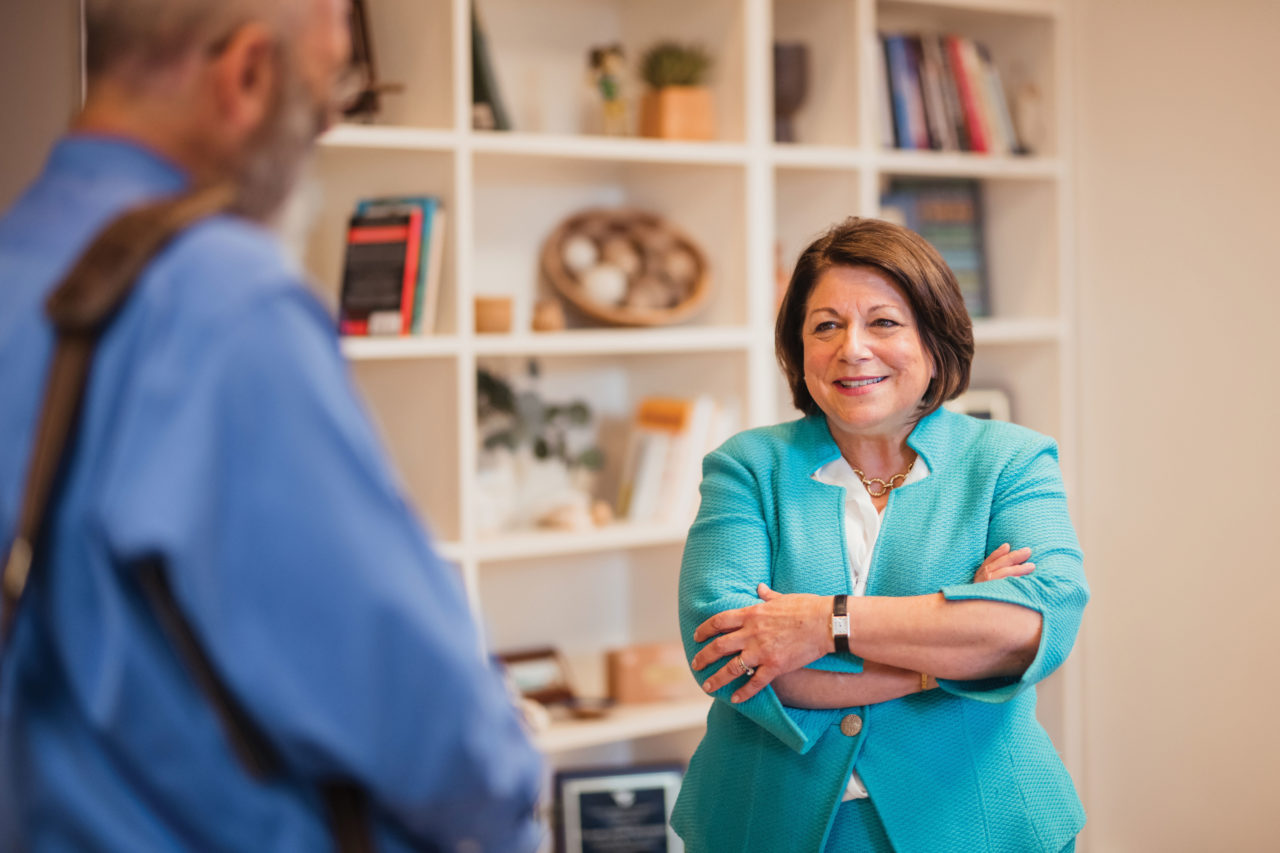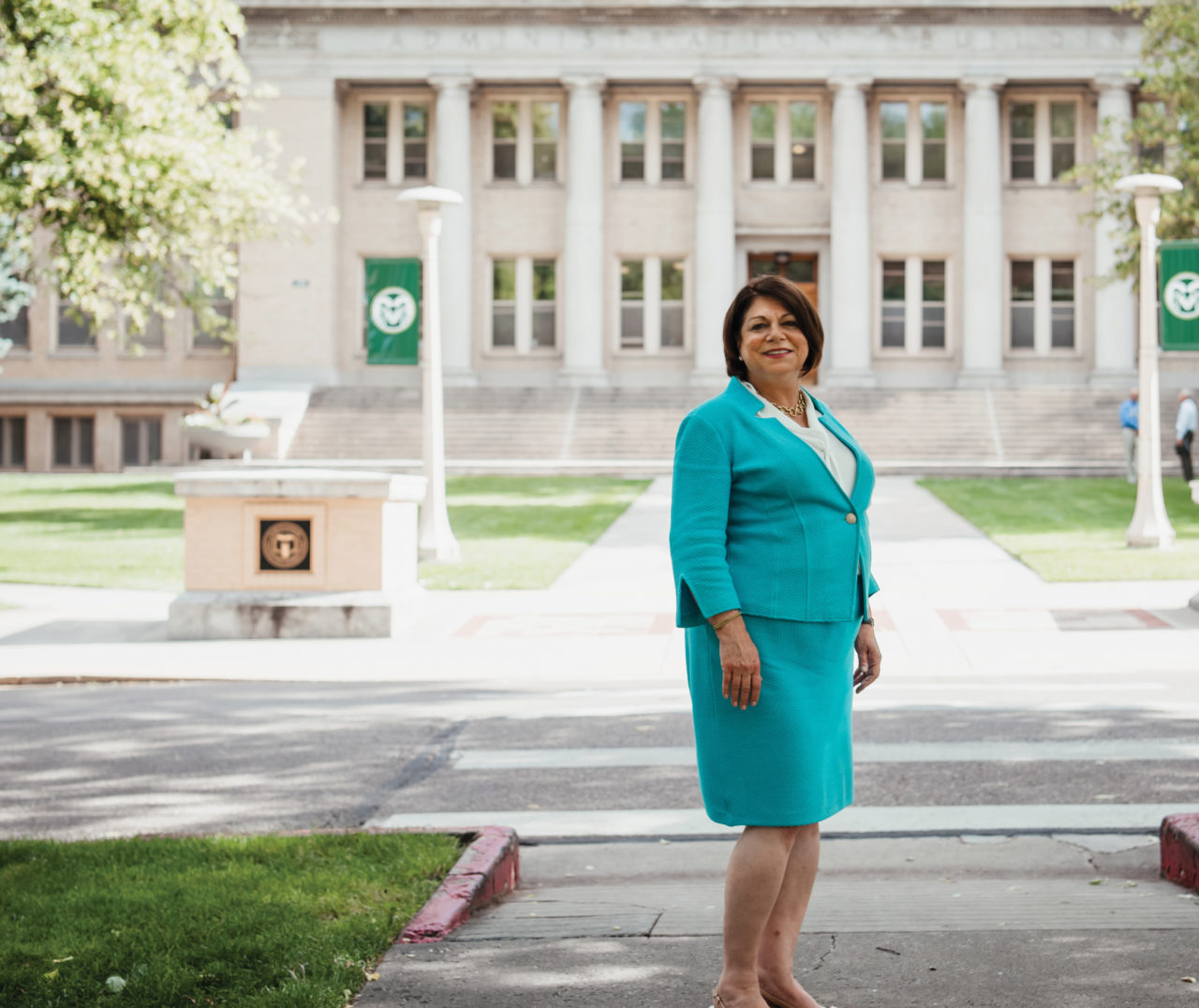Colorado State’s new president is in a class by herself.
by Larry Borowsky | photos by Patrick Edmiston
Back when Joyce McConnell taught property law in West Virginia, students always dreaded the dense section on estates. So when it was time to introduce that part of the course, McConnell went out of her way to liven things up.
“You know that scene in Monty Python where King Arthur comes over the hill, and the serfs are moving the clods of dirt around?” she says. “I used to tell my students: ‘I know you’ve all heard Estates and Future Interests is the hardest section in the class, so I’ve worked very, very hard on this presentation to simplify things.’ And then I’d show the scene… ”
ARTHUR: How do you do, good lady. I am Arthur, King of the Britons.
PEASANT WOMAN: King of the who?
ARTHUR: The Britons.
PEASANT WOMAN: I didn’t know we had a king. I thought we were an autonomous collective. Who are the Britons?
ARTHUR: We are all Britons. And I am your king.
PEASANT WOMAN: Well, I didn’t vote for you…
“You’d hear about half the class cracking up,” McConnell says, laughing, “and they’re going, ‘Oh no, she didn’t!’ And the other half is going, ‘What on earth is this? How does this help?’”
The vignette illustrates the irreverence McConnell brings to nearly every situation. But it also points to her serious convictions about education. And it hints at the type of leader she’ll be as Colorado State University’s 15th president – and the first woman to hold the office.
Like Monty Python’s peasants, McConnell has little use for pomp and is quick to puncture dubious claims on authority. She leads cooperatively and works from the bottom up, taking her cues more from the rank-and-file than from royalty. She regards education as a universal right, not a prerogative of the privileged. And she’s deeply rooted in pastoral values, committed to mindful stewardship of natural resources.
“She is the absolute best choice for CSU,” says Angie Paccione, executive director of the Colorado Department of Higher Education. “She’s got the ideal temperament – the desire to collaborate, the ability to convene people, the ability to move them forward together.”
“I just loved being in meetings with her,” adds Wheeling attorney Linda Bordas, a board member of the West Virginia Justice Association and a longtime McConnell colleague. “Meetings are usually so boring, but they were never boring when Joyce was in the room. She brought an energy that got people excited.”
Paccione, who earned her Ph.D. at CSU and spent nine years on the faculty, is definitely fired up. “I still bleed Green and Gold,” she says. “And I’m excited to see how Joyce takes things forward and shapes the community.”

A longtime champion of diversity, McConnell wants CSU’s doors to be open to all.
McConnell comes to CSU after 24 years at West Virginia University, where she rose from law professor to law school dean to provost. The Appalachian state’s trajectory parallels Colorado’s more closely than you might think. Mountainous and largely rural, it’s in the process of modernizing an economy long dominated by mining and agriculture. Likewise, WVU and CSU mirror each other as land-grant institutions that are breaking new ground in fields such as medicine, food production and climate science.
Although she’s not from an agrarian background (she grew up in the D.C. suburbs), McConnell fell in love with the land-grant mission when she arrived at WVU in 1995. “It was like this perfect discovery,” she says. “I came to realize that the land grants stood for things I had always believed in. It’s truly education for the people. They’re not elitist institutions. They offer everyone a pathway to a better future. I also love the pioneering spirit that comes with land-grant institutions. They’ve always been about finding practical solutions to very complex problems, whether it was agriculture and mining in the 1870s or dealing with the disruptive changes in the world today.”
Many of the disruptive changes McConnell confronted at WVU had to do with environmental and economic upheavals in West Virginia’s coal industry. While still a law professor, she became an expert on water quality and wastewater management in Appalachia, whose aquifers carry many generations’ worth of mining pollution.
Later, as dean of the law school, McConnell established nationally recognized institutes of environmental law and sustainable energy at WVU. She also forged essential connections between town and campus, building alliances with power utilities, coal companies, natural gas developers, environmentalists and state policy makers. Those efforts yielded forward-looking initiatives involving climate change, carbon capture and alternative energy, nudging West Virginia’s extractive industries into the 21st century.
McConnell was such a deft coalition builder that she was asked to serve as president of the Board of Trustees of the Nature Conservancy’s West Virginia chapter and – simultaneously – on the board of directors of Antero Resources, a Denver-based oil and gas company that operates extensively in West Virginia.
“Joyce had trust on both sides,” says former West Virginia legislator Meshea Poore, who now serves as WVU’s vice president of diversity and inclusion. “You earn respect by the way you give it. She is that person. She’s going to meet you where you are and try to move you where she thinks you need to be, but she’ll do that respectfully.”
“She can move seamlessly between the academic and corporate worlds, representing the interests of each to the other,” adds WVU president (and former University of Colorado president) Gordon Gee. “Her advice is sought and her opinion heard.”

She also seeks advice and hears others’ opinions, a trait for which McConnell draws frequent praise. Colleagues laud her ability to draw out information and elicit honest opinions, however fraught they may be. She’s said to excel at keeping teams on task and discussions on point, even regarding matters that lie beyond her direct expertise. “She’s very hands-on,” Bordas says, “and she gets everyone to participate.”
WVU attained coveted R1 status in 2016, two years into McConnell’s tenure as provost. She helped make it happen by marshaling the resources to broaden and deepen WVU’s research portfolio, championing public-facing projects focused on sustainability, water quality, neuroscience and other issues. McConnell also launched an entrepreneurship and innovation incubator to help new technologies migrate from WVU’s labs and design shops to the private sector.
That kind of infrastructure is already well developed at CSU, so McConnell won’t need to focus on pouring the basic foundation. Her challenge is to add height to the tower – to find (in her words) the “sweet spots” where faculty expertise, commercial potential and the public good intersect.
“There’s a tremendous push to create collaborative spaces for research,” she says. “For an example, let’s take agricultural innovation. We have engineers who are figuring out how to build more sensitive sensors [for irrigation]. We also have incredible researchers who are working on the soil microbiome and trying to figure out how to enhance agricultural yields. Both of these are dependent on water issues, and we have researchers who are working on that. When you put them all together in one space, you actually get more ideas because they’re feeding off one another. It’s extraordinary to put them together into one package.”
“We’re particularly well positioned to take on research that matters and has an impact,” McConnell adds. “That’s where I really see that I can make a difference.”
Back to Monty Python for a moment.
As she has ascended the leadership ranks, McConnell often has found herself the only woman at the table. That’s hardly uncommon at R1 institutions, where male-dominated scientific and technological disciplines typically wield a great deal of influence. But it can leave one feeling – and being treated – like a peasant in a room full of King Arthurs.
McConnell has perfected the art of upending such hierarchies and asserting herself with disarming directness – of saying, in effect, “I didn’t know we had a king” without making enemies.
“She’s not intimidated,” Poore says. “She advocates with ease for voices that have been overlooked. It’s not something she has to work at, it’s just an easy fit for her.”
“Joyce helped our university become a more diverse and inclusive place,” says WVU president Gee. “Many programs on our campus bear her imprint, but more than any single program, her impact is felt in the broadening of attention to and support of issues of diversity and equality.”
As the first woman to lead CSU, McConnell likely would have been cast as an equity champion regardless of her track record. In this case, she has the achievements to merit the billing – all the more so for having compiled them in a state that generally lags behind national trends in diversity. When same-sex marriage became legal nationwide in 2015, WVU still didn’t have a campus organization for LGBTQ+ students and faculty. McConnell created one. She also established an Office of Global Affairs to support international students and faculty, created a Women’s Resource Center and Women’s Leadership Initiative, reformed WVU’s Title IX office, and bolstered support resources for military veterans and first-generation college students.
Poore cites the West Virginia office of Advance, which McConnell expanded to diversify the university’s faculty and leadership ranks. “It’s a blueprint for women and people of color to advance,” Poore says. “It offers the training to help you achieve tenure, get promotions and rise into leadership. When you look at the people she put into leadership roles, they’re people she nurtured personally. She supported them, she gave them the opportunities, she allowed them to grow into those spaces. And they’ve been successful.”
At CSU, McConnell inherits a leadership team that’s already more than 50 percent female and includes African American and Latinx vice presidents. Moreover, the school’s minority enrollment has roughly doubled since 2000. But, says Paccione, “it goes beyond just getting numbers. We have to make sure those students succeed – that they’re graduating, completing their degrees and getting good jobs.” There’s plenty of room to attract more women and students of color into science and technology disciplines, both in student enrollment and in faculty hiring.
“She’s just so inclusive,” Bordas says. “She gives people a sense of belonging, and that means everyone. She was constantly working to recruit qualified women and minorities to the law school, and she was also inclusive of the legal community and had a lot of respect within the profession throughout our state. That’s a hard line to toe.”
She has a tough act to follow in Tony Frank. While McConnell is grateful for the extraordinary momentum her predecessor generated, she acknowledges that it comes with high expectations. Merely keeping things on track won’t satisfy many at CSU, least of all her. She needs to keep pushing the trajectory upward.
“It’s an incredible honor to be in this position,” she says. “I feel very fulfilled. But I also have a great sense of responsibility, as any ‘first’ does, because you want to do well and you want other people to be proud. I think the most important thing is the message that it sends to other women – particularly younger women who may be wondering ‘Can I do that? Is there room for me?’ When they see someone actually break through a barrier, that makes a big difference.
“I have the opportunity to use this leadership role to make it possible for other women to achieve, too,” McConnell says. “And that’s an extraordinary privilege.”






